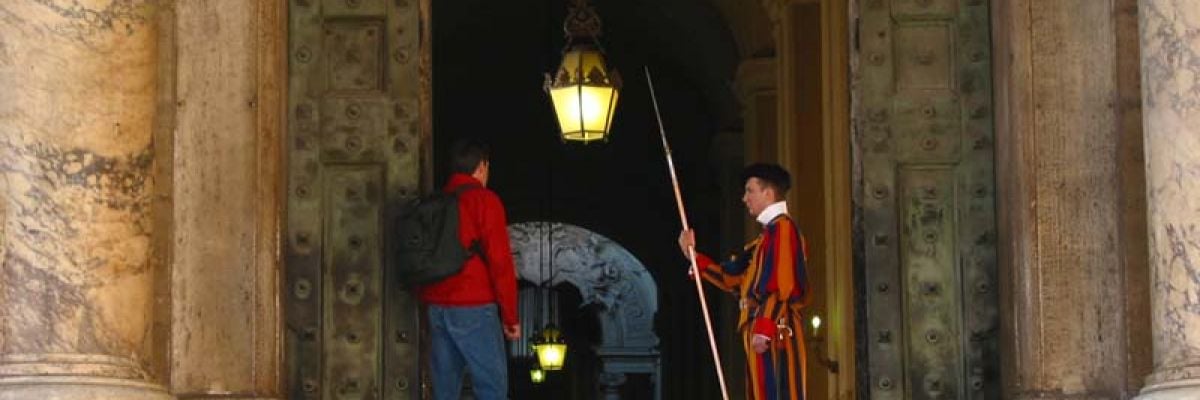
It would seem at first that the hard work of evangelization is getting people to make the leap into the Tiber. Once they’re convicted that the Catholic Church offers the fullness of Christian truth, getting them to complete their swim across should be, relatively speaking, cake. Right?
Ye converts out there, forgive this cradle Catholic for his naiveté. Because apparently it’s not so easy—at least, so says theologian and apologist Taylor Marshall, who recently recounted ten obstacles to entering the Church, drawn from his own experience and those of his convert friends.
Many of them make perfect sense, from my outside perspective: such as #10, theological submission, or #4, non-Catholic ridicule and estrangement. Others are head-scratchers to one degree or another. Do Protestants find Catholic liturgies an impediment to conversion, as Marshall asserts in #8? Perhaps the highest of high-church Anglicans might, if he found himself facing a particularly barren liturgical landscape. But I wonder how much your average Evangelical would object to a Mass with “broken rubrics and oddities,” as Marshall implies they would. Even a banal or irregular liturgy, it seems to me, offers more to satisfy the soul’s need for mystery and transcendence than most varieties of Protestant service.
Or what about Marshall’s assertion (#3), that “Catholic ridicule and estrangement” create obstacles to conversion? I can’t wrap my brain around this one. From my vantage point, Catholics treat converts like rock stars. They’re living validations of our own faith, and they tend to bring with them a zeal for worship, a knowledge and love of Scripture, and an enthusiasm for evangelism and witness—all these things welcome shots in the arm for the rest of the Body of Christ. So am I missing something? Is there mistrust, chauvinism, even “ridicule” from Old Catholics toward New Catholics of which I’m not aware?
I find zero room to quibble, however, with Marshall’s obstacle #2: the Rite of Christian Initiation of Adults:
RCIA must have been invented so that every conversion to the Catholic Church might somehow be miraculous. It is becoming an element of Catholic lore that RCIA is commonly led or organized by someone who is a “type B” Catholic as described above. These people don’t seem to understand how zealous these converts can be. These leaders stress the “feelings” part of Catholicism and not the “orthodoxy” part of Catholicism, much to the chagrin of the converts who have had it up to their ears in Protestant appeals to their feelings.
It’s amazing how many people “give up” in RCIA. It’s also amazing how many push on through. I know many who have had wonderful RCIA experiences, but I know many more who had to defend the Catholic faith while taking RCIA.
My own point of reference for RCIA, apart from having heard many dismaying anecdotes that fall under the heading of “lore” above, is the handful of years I spent as part of a parish team. Sadly, all the problems to which Marshall refers or alludes were present: an aloof attitude towards to the catechumens’ decision to convert; an overemphasis on subjectivity and emotion (our unofficial motto was “What does Jesus mean to you?”) and an underemphasis on Catholic doctrine; severe imprudence (to put it most benignly) in allowing unqualified members of the team to instruct the group—our future Catholics would learn about the Eucharist from the Catechism one week and the papacy from Richard McBrien the next; and an omission or misrepresentation of difficult teachings, particularly the moral ones, leading to scenes (exactly as Marshall relates) in which the better-read catechumens were compelled to instruct their instructors.
Marshall doesn’t mention this, but in my experience there was also disproportionate attention to tangential things, many of them silly: a “ministry sign-up night” (apparently one can’t be a good Catholic without being an extraordinary minister, lector, or greeter), learning and performing a song about St. Peter that would be barely appropriate for second-graders, movie nights and car washes and endless share-n-care discussion groups.
Our RCIA leader, ordinarily a flexible sort when it came to the precepts of the Faith, became a hard-bitten reactionary when it came to the process of “the rite”—in our case, meaning the process decreed by the North American Forum for the Catechumenate, the extra-ecclesial organization to which countless pastors around the country have farmed out the formation of souls. In short, we taught these new Catholics that some infallible apostolic doctrines were optional but the latest pastoral resource-of-the-month was carved in stone and inviolate.
How did we reach this condition in which the principal gateway for adult entrance into the Catholic Church is too often barred by locked doors and hidden traps? More importantly, can we fix it? Or should we not even try? After all, the Church was leading people into the Church for centuries without the “rite” as we know it today. And if experience and common anecdote are to be believed, the problems with RCIA may be structural and systemic, not merely abuses in implementation.
With all respect to the many parish leaders and catechists out there who do strive to form converts well, perhaps it’s best to start fresh: with a process for entering the Church that is simpler, more direct, more robust, and less prone to mischief.



